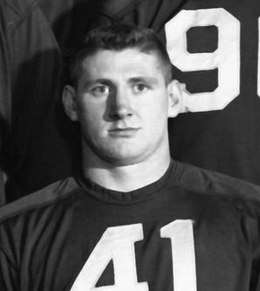Darrell Harper
Darrell L. Harper (June 18, 1938 – January 19, 2008) was an American football player. He played at the halfback position for the University of Michigan from 1957 to 1959 and for the Buffalo Bills in the 1960 AFL season. On September 11, 1960, Harper scored the first official points in the history of the Bills. He also made the Bills' first kickoff, first field goal and first extra point kick.
| No. 41 Michigan Wolverines | |
 Darrell Harper, 1959 | |
| Born: | June 18, 1938 |
|---|---|
| Died: | January 19, 2008 (aged 69) Commerce Township, Michigan |
| Career information | |
| Position(s) | Halfback/Placekicker |
| Height | 6 ft 1 in (185 cm) |
| Weight | 194 lb (88 kg) |
| College | Michigan |
| High school | Royal Oak High School, Royal Oak, Michigan |
| AFL draft | 1960 / Round: Second Selections |
| Drafted by | Buffalo Bills |
| Career history | |
| As player | |
| 1957–1959 | Michigan |
| 1960 | Buffalo Bills |
University of Michigan
Harper attended high school in Royal Oak, Michigan, before enrolling at the University of Michigan in 1956. He played football for the Michigan Wolverines football team from 1957 to 1959.[1][2][3]
As a junior, Harper appeared in 7 of 9 games for the 1958 Michigan Wolverines football team,[4] three of them as the starting left halfback.[2] He was Michigan's leading rusher in 1958, totaling 309 rushing yards, 137 receiving yards, 131 passing yards, 60 kickoff return yards and 33 punt return yards.[4] Playing against Minnesota in October 1958, Harper ran 58 yards for the game-winning touchdown on the first play of the second half.[5] Harper also handled punting duties for Michigan; he had a 61-yard punt against Michigan State in October 1958.[6]
As a senior, Harper started all nine games at the left halfback position for the 1959 Michigan Wolverines football team.[3] In the third quarter of the October 1959 game against Minnesota, Harper caught a punt at Michigan's 17-yard line and returned it 83 yards for the game's first points.[7] The return set the Michigan record for the longest punt return, a record which stood until 1972 when David Brown returned a punt 88 yards.[4] During the 1959 season, Harper rushed for 224 yards and also contributed 101 yards on punt returns and 62 yards on kickoff returns.[4]
Buffalo Bills
Harper was selected by the Detroit Lions in the 15th round (171st overall pick) of the 1960 NFL Draft.[8] He signed instead with the Buffalo Bills in the newly formed American Football League. Harper played as a halfback and placekicker for the 1960 Buffalo Bills and led the AFL with 10 extra points.[8] At 2:08 p.m. on Sunday, September 11, 1960, Harper made the opening kickoff in the first regular-season game in the history of the Buffalo Bills.[9][10] He also scored "the first official points" in Bills' history (and the first points in the game) on a field goal from the 35-yard line.[11][12][13] After taking a 3-0 lead on Harper's field goal, Buffalo did not score again and lost by a score of 27-3 to the New York Titans.[10][14]
In the Bill's second game (and home opener) on September 18, 1960, Harper successfully converted the Bills' first extra point kick after Wray Carlton ran for the team's first touchdown.[11]
Playing against the Los Angeles Chargers on October 2, 1960, Harper kicked the second field goal in team history.[15]
Later years and death
After finishing his career as a football player, Harper worked as a teacher and high school football coach for many years in Highland Township, Michigan. He also coached at Walled Lake Central High School.[16] Harper died in January 2008 at age 69. He died of complications of multiple myeloma at Huron Valley-Sinai Hospital in Commerce Township, Michigan.[16][17]
References
- "1957 Football Team". University of Michigan, Bentley Historical Library.
- "1958 Football Team". University of Michigan, Bentley Historical Library.
- "1959 Football Team". University of Michigan, Bentley Historical Library.
- "Michigan Football Statistic Archive Query Page". University of Michigan.
- "Michigan Trims Minnesota, 20-19". Independent Press-Telegram, Long Beach, California (UPI story). October 26, 1958.("Michigan went to the air Saturday to set up a pair of touchdowns and Darrell Harper reeled off a 58-yard scoring run on the first play of the second half to give the Wolverines a tight 20-19 victory over winless Minnesota and possession of the Little Brown Jug for another year.")
- Wilfrid Smith (October 5, 1958). "Michigan, Spartans Ties". Chicago Daily Tribune. p. A1.
- "MICHIGAN BEATS MINNESOTA, 14-6; Harper and Julian Score on Long Runs in Third Period in Little Brown Jug Game". The New York Times. October 25, 1959.
- "Darrell Harper". profootballreference.com.
- William J. Ryczek (2009). Crash of the Titans: The Early Years of the New York Jets and the AFL. McFarland & Company, Inc. p. 113. ISBN 978-0-7864-4126-6.
- "1960 Buffalo Bills". pro-football-reference.com.
- Jeffrey J. Miller (2007). Rockin' the Rockpile: The Buffalo Bills of the American Football League. ECW Press. p. 94. ISBN 978-1-55022-797-0.
- "Buffalo Bills Records". NFL Team History.com. Archived from the original on 2010-08-11.
- Harper's field goal did not mark the first points scored in AFL history. That mark was set in a night game played between the Dallas Texans and Los Angeles Chargers on September 10, 1960.
- "Chargers, Oilers And Titans Capture Openers In New AFL". Hamilton, Ohio, Journal – The Daily News. September 12, 1960.
- Miller et al., Rockin' the Rockpile, p. 98
- "Darrell Harper, Highland Township:'Coach Harp' taught generations of youths". The Detroit News. January 22, 2008.
- "Social Security Death Index (SSDI)". Roots Web.